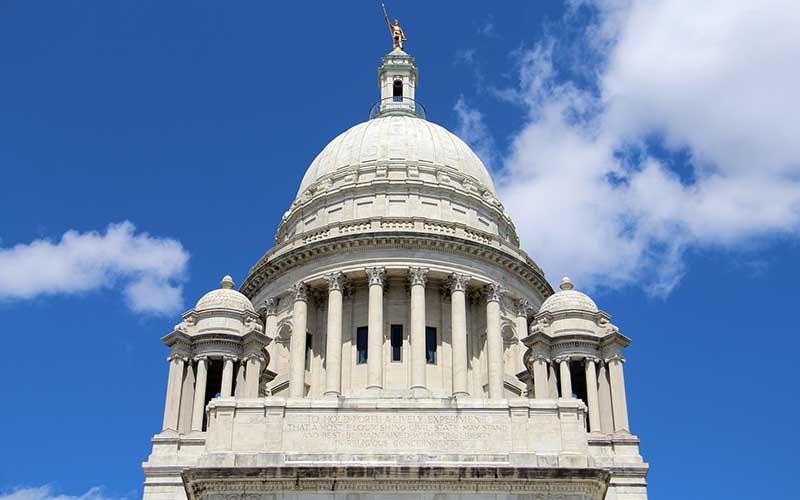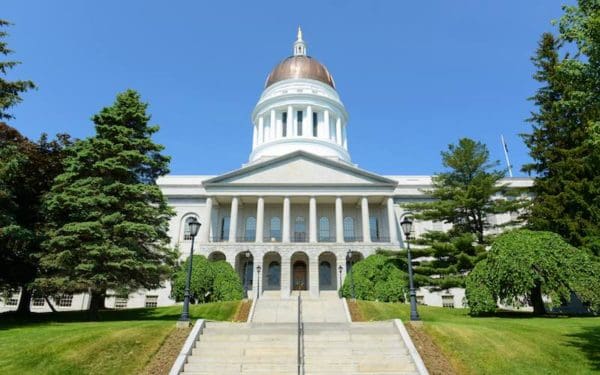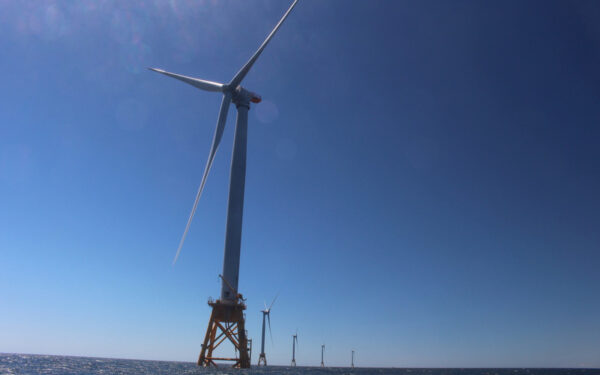
The Rhode Island General Assembly closed its session in June having made little progress on urgent climate legislation. Photo: C. Hanchey via CC By-NC 2.0
When the Rhode Island General Assembly convened for its 2018 session, CLF and our partners focused on several key measures aimed at combating climate change, reforming how energy projects are sited, and protecting our waters from offshore drilling. With progress on these issues stalled (or moving in reverse) at the national level, state and local action is more important than ever in keeping our communities, our economy, and our natural resources safe and resilient.
Unfortunately, despite tremendous effort as well as support from our members and constituents, we were disappointed. By the time it wrapped up the session at the end June, the General Assembly had failed to make meaningful progress on any of these critical issues. The silver lining? Environmentalists defeated two harmful bills – one that would have led to the construction of a dirty biomass facility and another that would have opened the door to the sale of the Scituate Reservoir with little oversight or protections.
Now, all eyes are turned to November, when we all have an opportunity to make our voices heard in support of the Green Economy and Clean Water Bond.
No Action on Climate Change
CLF’s main priority this session was turning Rhode Island’s aspirational goals for cutting climate pollution into enforceable mandates, an initiative we are pursuing across New England. Modeled after laws in Massachusetts and Connecticut, the Rhode Island Global Warming Solutions Act (GWSA) was introduced for the first time this year (thank you, Representative Handy and Senator Euer for sponsoring the bill). Both the House and Senate Environment Committees held hearings on their respective versions of the GWSA, but neither chamber voted on it.
In addition to pushing for enforceable cuts to carbon emissions, CLF also supported EnergizeRI’s carbon pricing bill. If enacted, the bill would have imposed an economy-wide price on carbon emissions. This is the fourth time the bill has been taken up by the General Assembly, but it, too, failed to gain traction and was not voted on by either chamber.
The GWSA and the carbon pricing bill represent two approaches to addressing one of the most serious and urgent problems facing Rhode Island and the world: climate change caused by carbon emissions. The GWSA would require mandatory, legally enforceable regulations ratcheting down carbon emissions annually from the three major sectors contributing to the problem – electricity, transportation, and buildings. The carbon-pricing bill would have put a substantial price on all in-state carbon emissions. Either measure would have had the real-world effect of putting Rhode Island on a path to reducing its emissions by 80% below 1990 levels by 2050.
We also advocated for funding for a carbon pricing study bill that passed last year. The study would examine the impact of carbon pricing on Rhode Island’s economy and carbon emissions. Unfortunately, the study remains unfunded.
We are disappointed that the General Assembly kicked the can down the road on the urgent action needed to cut climate-damaging emissions in Rhode Island, but we are not giving up on either of these bills yet. When the General Assembly reconvenes in January, CLF and our partners will be back at the table pushing them forward.
Energy Siting Bills Stalled
When it comes to building energy projects in Rhode Island – like Invenergy’s proposed fracked gas power plant – a permit must come from the state’s Energy Facility Siting Board. Advocates have long pushed for reforms to the way this State body operates and, earlier this year, CLF served on a study commission to reform it.
We advocated that, when considering a project, the Siting Board adhere to the State’s carbon emission reduction goals and include environmental justice in its criteria. We also recommended the creation of a public advocate similar to one in New Hampshire. The Chair of the study commission, Rep. Keable, introduced a bill to reform the Siting Board that included many of CLF’s recommendations. But while the bill passed the House, it died in the Senate.
These reforms would be significant for a simple reason: Today, the Siting Board is not legally required to consider the carbon and climate impacts of its decisions. If the Keable bill had become law, then the Siting Board would – for the first time – have been legally obligated to consider climate impacts.
Several bills were introduced regarding solar siting. CLF supported legislation that would have created solar siting standards; it passed the House but died in the Senate. A legislative fix is necessary to ensure that we have smart siting of solar – encouraging development on brownfields, rooftops, and parking lots as opposed to in forests.
CLF, along with several environmental organizations and government agencies, opposed a bill that would have prohibited renewable energy incentives for solar projects in forests because the bill only reduced incentives for renewable development. CLF and the rest of the environmental community were united in supporting a more balanced approach that both recognizes the need to preserve forest and open space while also maintaining incentives for development of renewables.
Offshore Drilling – Resolution Passed But Bills Held
CLF supported resolutions against President Trump’s plans for offshore drilling as well as bills designed to prohibit drilling and exploration activities within state waters while restricting oil and natural gas infrastructure. While Senator Miller’s resolution passed, the House version did not.
The bills introduced in both the House and Senate died in committee, perhaps due to concerns raised by the Coastal Resources Management Council that the legislation would preempt its existing oversight. Despite the limited legislative success, Rhode Islanders united against Trump’s plan to open our coast to offshore drilling.
Biomass Dead
CLF worked with several environmental groups and legislators to defeat a bill that would have allowed burning biomass to qualify for net-metering renewable energy credits. The bill was introduced on behalf of a developer who wanted to build a high-heat facility in Johnston. CLF (and the rest of the environmental community) opposed the bill because biomass is not clean energy; indeed, burning some forms of biomass emits more carbon than burning some fossil fuels. In addition to a silent protest and a press conference to raise awareness of public opposition to the bill, we prepared a memo debunking the developer’s claims. While the bill flew through the Senate, we were able to defeat it in the House.
Scituate Reservoir Remains in Limbo
CLF joined several other environmental organizations testifying in opposition to bills that would have allowed the sale of the Scituate Reservoir without oversight by the Public Utilities Commission or crucially important protections either for the reservoir itself or the now-protected forests surrounding it. Oversight by the Public Utilities Commission is critical to ensuring a transparent process reasonable and rates for consumers. The City of Providence is determined to sell the Scituate Reservoir to help pay down its pension debt, so we expect a new iteration of the legislation next session. We hope the City will recognize the importance of both oversight by the Utilities Commission and protection of the watershed.
Vote for the Green Economy and Clean Water Bond on November’s Ballot
CLF supported the legislation that put the Green Economy and Clean Water Bond on the ballot in November. If passed, the bond will make funds available for making our coast more resilient to climate impacts, improving the health of Narragansett Bay and other waterways across the state, cleaning up former industrial sites or “brownfields,” protecting historic farmland, and improving community parks, among other initiatives.
Pledge with CLF to vote in November – and please vote in support of this bond.
Looking Ahead to 2019: Determined to Do More
While we’re disappointed that some key bills failed to make headway this year, we’re not discouraged. We know from experience that it can sometimes take several legislative cycles before a bill gains the traction it needs to become law. We also recognize, however, that climate action can’t wait. As we look ahead to the start of the next legislative session in January, we will be working with legislators, partners, and allies to shore up support for the Rhode Island Global Warming Solutions Act, as well as carbon pricing, energy siting reform, and ways to prevent offshore drilling.
Thank you to those who took action and made your voices heard!




